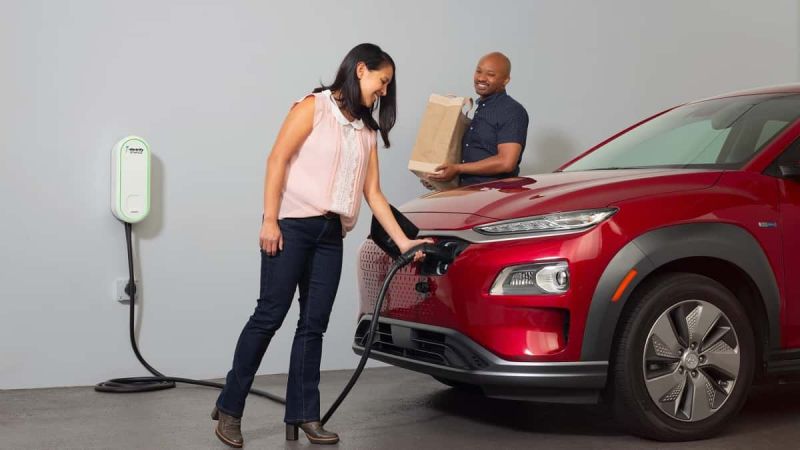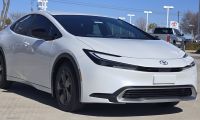Electrify America has just introduced its first at-home charger in the U.S. The new charger comes at a cost of $499 and is available from Amazon.com. We checked the availability today and found that the new charger has a two-day delivery with no shipping costs for Prime members. It can also be purchased directly from the company. The price includes a three-year warranty and 24-hour technical support.

The new charger is compatible with every electric vehicle available in the North American market today according to Electrify America. It has a charging power of up to 7.6kW – roughly 6 times faster than the typical Level 1 charger provided to some new EV owners, depending on vehicle make and model. In our testing, Torque news has found that the 115V chargers that EVs come with only add back about 3 or 4 miles of range per hour on the charger. “At Electrify America, we are constantly innovating to meet the diverse needs of electric vehicle drivers and are excited to expand our product offering to help advance EV adoption,” said Nina Huesgen, Senior Manager, L2 Operations & Program Management at Electrify America. “We recognize that many of today’s EV drivers do more than 80 percent of their charging at home, and with the introduction of our L2 home chargers, Electrify America is providing consumers with a more convenient and reliable option that should help increase the appeal of EV ownership.”
The company says that the new chargers have the following advantages:
Flexible installation options: For easy installation, the L2 home charger comes with a standard NEMA 14-50 supply power plug, compatible with the 240-volt outlets commonly found in households. The unit can also be hardwired by a licensed and qualified electrician and comes with a docking station that allows for wall-mounting.
Indoors or outdoors: The home charger is equipped with a NEMA 3R enclosure, allowing it to be mounted inside or outside. A 24-foot long cable makes it easy to reach and plug into your car.
Colored light that indicates charging status: An LED color indicator makes it easy to view charging status, with a ring around the charger that lights up blue while the car is charging and lights up green when the battery is full.
Technology of the future: The home charger is equipped with Wi-Fi connectivity, which allows Electrify America to provide customers with even more data about their home charging sessions and will enable utility demand response programs in the future.
Three-year warranty, 24-hour support: Electrify America offers a three-year warranty and 24-hour customer support.
Easy installation: Electrify America is working with Qmerit, a company that specializes in EV charger installations across the country, to deliver a seamless installation experience. Customers can first visit com/charging-at-home to complete a survey about their home’s electrical capacity and installation needs, designed to streamline the in-home installation process. They will then be provided with as many as three competitive pricing quotes from pre-certified EV charging station installers in their area.
Customers who do not already have a dedicated 240V line from their electrical panel to the location of the charger should consult with a local electrician (if they do not work with QMerit). Also, pulling a permit from the town is always a good practice. It is important to remember that the panel must be able to support the charger current and have space to add breakers. Most EV owners budget between $400 and $1,000 for EV charger installation costs. Those with older homes, or who plan to install a charger in a location not attached to the home should budget more.

In addition to covering green vehicle topics, John Goreham covers safety, technology, and new vehicle news at Torque News. You can follow John on Twitter at @johngoreham.
Set Torque News as Preferred Source on Google












Comments
It makes sense that Electrify
Permalink
It makes sense that Electrify America would offer home chargers. They will probably offer bundle/install packages with future VW/Audi/Porsche EVs. I do suspect that they have a secondary motivation that they may count all of the home EVSE stations as Electrify America EV charging stations, even though home installations are not really accessible to the general public. Six years ago I had a Blink 240V EVSE installed at my home (hard wired). The Volt which I had at the time had an on-board charger that limited the 240V charging speed compared to newer models (including the 2019 Volt and Bolt) which offered (2X) 7.2kW/240V charging. My Volt and ELR take about 10hrs to charge 45 miles at 110V, and getting the 240V charger I was able to cut that time to about 3.5 hrs, or about 12 EV miles of charge per hour. My neighbor's home Tesla charger can do an amazing 52 miles an hour, but then again he has a much bigger battery to fill up. From a day to day point of view the included 110V charger would have worked fine most of the time, as it is usually more than 10 hours from the time that I get home to the time that I leave for work the next day. But there is another advantage of adding a faster 240V charger is that my power company has lower electricity rates from 11PM to 7AM, so being able to fully charge during those times cuts power costs. I thought that it was funny that Electrify America featured a Hyundai in their promo pics because it was an insult that they end up charging 2X for Hyundai fast charging because of their charging/billing rates, and I don't think that they fixed it yet. To connect those dots, VW started Electrify America to atone for their dieselgate scam and move towards EVs. So the fact that one of VWs biggest EV rivals is Hyundai clearly had an effect in their biased fast charge pricing model. But back to this charger...My Blink charger cost $500, Six years ago, plus $200 to hardwire the charger into my panel by an electrician. You can fine 240V EVSEs today for $150, but the Electrify America model clearly has some extra bells and whistles for online use and tracking. If your home has an accessible 220V plug (electric dryer anyone?) then most EVSEs like this one can just plug in to that special high power socket, but otherwise you will need to budget in an electrician. Since most BEV and PHEV owners charge at home I figure that they will start offering higher speed home chargers (Tesla's regular Model S charger manages 32MPH). Currently PHEVs are capped out at 7.2kW, but if the automakers are serious about expanding to support EVs then new PHEVs may add fast charging so potentially you could add 50 miles of range in 2-3 minutes, which would make it quicker than a gas fill up. I need to give Electrify America credit for being serious about providing home chargers and fast chargers across the country. It will definitely help out upcoming VW BEVs in the future, and help the larger EV movement by making public fast chargers available all over. I just hope that they keep public charging prices reasonably low, so that EVs keep their relatively low operating cost advantages compared to gasoline cars and trucks. For instance, my Cadillac costs about 5 cents a mile to run as an EV when charged at home, whereas my previous Honda CR-V cost about 18 cents a mile to run on gasoline.
Sorry, but no plans to rewire
Permalink
Sorry, but no plans to rewire my house just to charge a car. Plan to stick to gasoline for as long as I can.
You can just use the 110V
Permalink
In reply to Sorry, but no plans to rewire by Digitaldoc (not verified)
You can just use the 110V EVSE that comes with the car. It just takes longer to recharge. For people with a 220V dryer outlet in their garage, they can simply plug in to 220V with a splitter. The only thing is that you probably wouldn't want to run the dryer at the same time as charging your car. There are a great many people where EVs are not the best fit, but you might want to rent an EV sometime just to see what it feels like. Many people who try out electric vehicles prefer them to gas cars. I still enjoy my gas powered cars too, but I cannot imagine not having at least one EV at home.
Why not 10 kilowatt output?
Permalink
Why not 10 kilowatt output? Same thing with their public level 2 charging stations. They are not 10-kilowatt or better, not ready for the future.